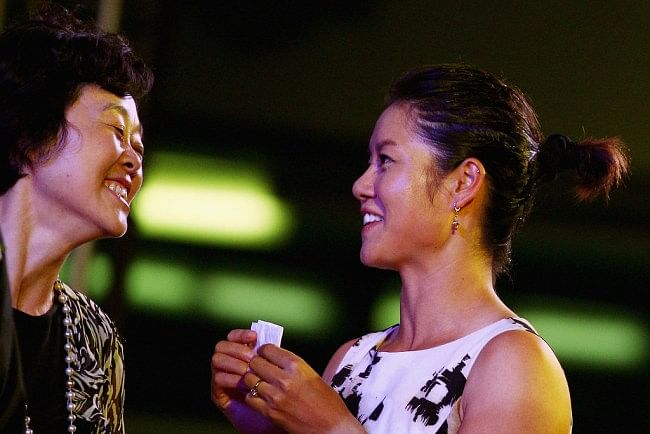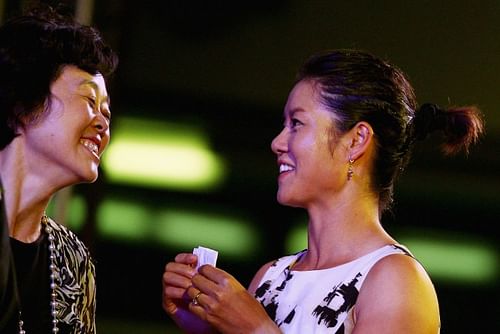
Li Na sick of questions with Chinese characteristics

Madame Sun Jinfang and Li Na
There have been many column inches devoted to Li Na’s temper over the past few weeks, both in the Chinese and foreign press. Prize to the most bizarre line goes to this LA Times piece which contains this gem:
In sports where performance calls for swift reactions — like tennis and soccer — China’s teams have typically struggled.
Er, table tennis anyone? Soccer occasionally calls for quick reactions (as does almost any sport), but to suggest that China is bad at soccer because their players cannot repeat and learn a move again and again is just, well, bizarre.
Most of the pieces in the foreign media inevitably paint Li Na as the crusading rebel, doing sport’s bit to undermine the government as China inevitably becomes a democracy (because it’s just a matter of time, right?).
For all Li’s obvious individuality, it’s worth pointing out that tennis authorities, headed by Madame Sun Jinfang, approved the “flying solo” system, not Li herself – best described as a cross between breaking free and being set free.
Here is this week’s Sport Talk column, looking at how differently Li Na is treated by the Chinese press than the other players are by their domestic media:
When Serena Williams was humbled by Sabine Lisicki at Wimbledon recently – the largest upset in a tournament full of them – no one asked her what she wanted to say to the American people, or whether she felt as if she had let her country down. If they had, they would likely have been on the receiving end of a glare and a withering response.
But every time Li Na loses a match, it seems, she is asked to offer some words of remorse to the Chinese people. It’s no wonder that she has been known to lose her temper when facing yet another asinine question.
Li has always had a frosty relationship with domestic media, in stark contrast to the international reporters who have lauded her for breaking free of the strict State-run system and her resulting success.
The portrayal of Li as a rebel with – gasp! – a tattoo has been rehashed many times. But the fact remains that her lively personality, charm and wit do not fit the mould of a typical Chinese athlete – and it’s a profile that Chinese reporters don’t often encounter. Athletes in China are trained from a young age to say the right thing, or better yet, say nothing at all, for fear of ruining their careers. Why venture an opinion and risk being criticized, the thinking goes, when silence is always the safer option?
But Li has long been secure enough with her own choices to volunteer a few choice opinions. Few would deny that Li’s adoption of a more Western approach to her game has been responsible for much of her success. Fans and media alike certainly embraced her when she became the first Asian to win a Grand Slam title. But when she exhibits supposedly Western traits in her interviews, she is slated in the press.
It’s hypocritical to embrace an athlete’s success when it stems from a distinctly non-Chinese source, but then criticize that athlete for not displaying distinctly Chinese tendencies.
Only time will tell how Chinese media take to Li in years to come, but perhaps things will work as they did for John McEnroe. Vilified during his playing days for his bad behaviour and verbal abuse of officials, he is now held in the highest regard on both sides of the Atlantic. If the original Superbrat can turn his enemies into friends, surely Li can win over a few one-dimensional reporters.